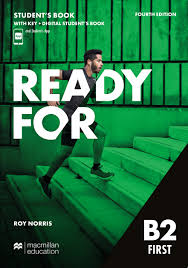Paraphrasing at B2 First: or to put it another way…
In this article, Roy Norris looks at paraphrasing in the Cambridge B2 First exam and shows how teachers can provide practice in this important subskill.
Paraphrasing in all four papers
When students are preparing for the Cambridge B2 First exam, there is a clear case for them to learn to express the same idea in a number of different ways, or in other words, to convey the same message in more than one way using a range of words and expressions, or indeed, to put it another way, to employ a variety of lexis and structures to communicate the same meaning. Paraphrasing is a skill which is tested, of course, in the Key Word Transformation exercise in the Reading and Use of English paper, but it is also very relevant in each and every one of the other three papers.
The five sentences from eight (A-H) which constitute the answers in Part 3 of the Listening paper, the multiple-matching task, often paraphrase the words of the speakers in the five short monologues. This may also be true of the questions in the multiple-matching task of the Reading and Use of English paper, Part 7. For the Speaking paper, we are encouraged, in the Cambridge English Qualifications: B2 First Handbook for teachers, to train students ‘to paraphrase when they do not know, or cannot remember, a word’. And in the Writing paper, students should avoid repetition and use a range of structures and vocabulary.
So, given the importance of paraphrasing throughout the B2 First exam, what can we as teachers do in our classes to develop this skill in our students? Firstly, there are certain activities which are specifically suited to some of the task-types mentioned above.
Preparing for Listening Part 3
Before tackling a Part 3 Listening task, for example, students could consider at least one alternative way of expressing the general idea contained in each of the eight sentences (A-H). ‘I don’t really care what clothes I wear’, might be expressed as ‘I don’t mind what I put on’ or ‘I pick out the first shirt I come across in my drawer - it’s just not important to me.’ This type of prediction task will help prepare students for what they might hear in the recording and, whilst they may not have time to do this for all eight sentences in the actual exam (they are given just 30 seconds to read them), it provides valuable practice in the skill of paraphrasing. Then, once they have completed the listening task and are checking their answers, students can refer to the script and compare their own predictions with what the speakers actually say.
Paraphrasing unknown or forgotten words
The game of Taboo provides useful practice for the Speaking paper, as players have to define or explain certain items of vocabulary to each other without mentioning them, thus simulating situations in which they ‘do not know, or cannot remember, a word’. The task is made more challenging, and hopefully entertaining, by providing five further words which students cannot include in their definitions. The target item bake, for example, might be written on a card and accompanied by the following five words which must not be used: cake, oven, cook, potato, bread. Taboo is commercially available, but cards can easily be made by teachers and used to revise previously seen vocabulary.
Overused words
Students are often called upon in both the Speaking and the Writing papers to discuss how important, interesting, difficult or useful something might be. It is important (!) therefore, that we ensure they have a range of adjectives at their disposal to express these very common concepts without repeating themselves. An exercise such as the following might be useful (!); it includes synonyms for the four adjectives already mentioned, as well as a number of other common words which are often repeated by students.
Avoiding repetition
In each sentence 1 - 8, complete the gaps with two words which have a similar meaning to the word which has been underlined.
absorbing attractive bothered concerned dull
essential fascinating tricky glad helpful indispensable
hard pleased practical picturesque tedious
1 It’s important to bring warm clothes, and a good pair of boots is _________ / _________.
2 I’ve just a really interesting book; the story’s _________ / ________ and it held my attention from start to finish.
3 I found the homework difficult. Everyone else found it _________ / _________, too.
4 Thanks for the useful tips. The advice you gave me is very _________ / __________.
5 I was very happy with the party. Are you _________ / _________ you came?
6 My cousin lives in a beautiful house in a very _________ / _________ village.
7 Paul was worried about the exam, but no one else seemed _________ / _________.
8 History lessons at my school are boring, and maths is just as _________ / _________.
You could then ask students to add one of the following, or similar adjectives to each group:
challenging crucial delighted handy intriguing monotonous stunning troubled
Key
1 essential, indispensable + crucial 2 absorbing, fascinating + intriguing
3 tricky, hard + challenging 4 helpful, practical + handy
5 glad, pleased + delighted 6 attractive, picturesque + stunning
7 bothered, concerned + troubled 8 dull, tedious + monotonous
An integrated approach
In addition to activities with specific papers or task-types in mind, general work on paraphrasing can be integrated into any lesson throughout an exam preparation course, using suitable texts from your coursebook. These could include reading texts, listening scripts, model writing answers, or Use of English texts. The following extracts are taken from different speakers in a Part 1 Listening:
1 It’s not like him to talk much about his plans.
2 Everyone went out of their way to help me.
3 It doesn’t matter how tall or short you are.
You could deal with this orally and, with books open at the script, ask students to underline the target sentences and express each one in a different way. Or you could prepare a written exercise beforehand, giving students alternative versions of the target sentences and asking them to find each one in the script. For example:
Find the sentences in the script which mean the following:
1 He doesn’t usually say a lot about what he’s going to do.
2 They all made a big effort to be helpful.
3 Your height isn’t important.
Student records and revision
Either way, each pair – the target sentence and its paraphrase – should be recorded in the students’ vocabulary notebooks, preferably alongside each other, rather than one above the other. This then becomes a useful tool for revision; students can cover up the target sentences and try to remember them, looking only at the paraphrases, or vice versa.
You can also very easily provide your own revision exercises. These can take the form of Key word transformations, thus providing valuable exam practice as well as showing students the direct link between what they learn in class and how it might be tested in the exam. For example:
Use between two and five words to complete the second sentence so that it has a similar meaning to the first sentence. You must use the word in capital letters.
1 He doesn’t say a lot about what he’s going to do.
LIKE
It’s …………………………… talk much about his plans.
2 They all made a big effort to be helpful.
WAY
Everyone …………………………… to help me.
If you feel that your sentence pairs do not lend themselves very well to the exam format, you could create an exercise in which students simply have to ‘complete each gap with one word so that the second sentence has the same meaning as the first’.
3 It doesn’t matter how tall or short you are.
Your …………. isn’t important.
Key
1 not like him to
2 went out of their way
3 height
The teacher’s role
As the Handbook for teachers says: ‘The ability to express a message in a different way shows flexibility and resource in the use of language’. It’s up to us as teachers to ensure that our students have sufficient practice in this important subskill in order both to develop their language resources and to prepare them for the B2 First exam. Or to put it another way, it’s our job to make sure our students get enough practice in paraphrasing to help build their language skills and get them ready for B2 First.
References
Cambridge English Qualifications: B2 First Handbook for Teachers (April 2019), Cambridge Assessment English
https://www.cambridgeenglish.org/
About the Author

Roy Norris worked for many years as a teacher and teacher trainer at IH Madrid, and also spent nearly two years as Director of Studies in Vilnius, Lithuania. He has been writing for Macmillan since 1999, and is the author of Ready for B2 First (now in its 4th edition), Straight to First and Straightforward Advanced, and co-author of Ready for Advanced.

Ready for B2 First 4th Edition
Ready for Life
From the bestselling Ready for Series, Roy Norris is back with Ready for B2 First 4th Edition
